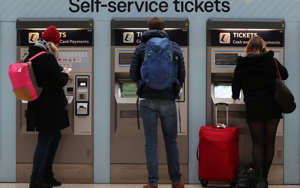Cheapest rail tickets can no longer be bought at booking offices as …
 © DANIEL LEAL-OLIVAS/Getty Images Commuters buy rail tickets at a self-service machine at Waterloo station - DANIEL LEAL-OLIVAS/Getty Images
© DANIEL LEAL-OLIVAS/Getty Images Commuters buy rail tickets at a self-service machine at Waterloo station - DANIEL LEAL-OLIVAS/Getty ImagesThe cheapest rail tickets can no longer be bought from all station booking offices, as passengers are forced to use machines or shop online for the best fares.
Rail bosses have begun barring ticket office staff from selling advanced fares, in a reversal of reforms designed to make it easier for passengers to buy the cheapest tickets[1].
Advanced tickets can be as much as a third cheaper than standard fares, but can still be bought up to 10 minutes before the train’s departure.
Officials have signed off a trial of the scheme of limiting where advanced tickets can be bought on Northern rail, the second-biggest operator in the country, which was nationalised in January 2020.
It comes as rail passengers have suffered a year of disruption with no end in sight[2] in a row between train operators and the Rail, Maritime and Transport workers union (RMT).
Bosses are also at loggerheads with drivers union Aslef in a separate dispute.
The latest wave of strikes is scheduled to take place next week, with three days of walkouts within four days. Aslef will strike on May 31 and Jun 3, the day of the FA Cup final. The RMT will walk out on June 2.
Services on Transpennine Express were nationalised earlier this month[3] after commuters on routes that run from Liverpool to Scarborough and as far north as Edinburgh suffered from a prolonged bout of disruption.
Passengers also continue to wrestle with the country’s confusing fare structure[4]. Rail fares have not been reformed since privatisation in the 1990s.
With the number of passengers doubling between then and the start of the pandemic, there are now 55 million different fares.
Rules preventing the sale of advanced tickets on-the-day were abolished in July 2017 as part of changes that rail bosses would allow “customers to get the best possible deal whenever they travel”.
Cheaper advanced fares were made available up to 10 minutes before departure under the reforms.
On Northern, an advanced fare between Leeds and York would be £8.20 compared with a standard off-peak single that costs £12.90, for instance.
The limiting of where advanced tickets can be bought to online and machines which some find confusing comes ahead of an anticipated wave of ticket office closures at railway stations in a major cost-cutting drive.
The Treasury has ordered the Department for Transport to balance the books on the railways after keeping services running since the start of the pandemic cost the Exchequer an estimated £42 billion.
Ticket offices would be closed and turned into flats, shops or offices under proposals tabled by bosses to rail unions.
The Government argues that the number of tickets bought at ticket offices has fallen from 85 per cent in 1995 to 12 per cent currently as more and more passengers use tap-in-tap-out services or pay for train services online.
But this still means that ticket offices are required for an estimated 177 million passenger journeys each year, according to analysis of official railway statistics.
There were 369 million passenger journeys in the final three months of 2022, the most recent figures published by the Office of Rail and Road, the industry regulator. This means there are just under 1.5 billion passenger journeys over the course of the year, 12 per cent of which comes to 177 million.
Caroline Abrahams, director at Age UK, said: “Millions of older people are not online and therefore rely on traditional methods, including face to face ones, for everyday transactions such as buying train tickets.
“It’s unfair if they are excluded from accessing the cheapest prices, just because they don’t own a smartphone or other digital device.
“Companies should be legally obliged to treat all their customers fairly when it comes to prices and access, whether they are internet savvy or not.”
Former transport minister Norman Baker, a director at the Campaign for Better Transport added: “The ticketing system on the railway is already far too complicated without adding further variations based on how and where you buy your ticket. People should not be penalised for using a ticket office.”
Proposals by train operators to unions, leaked to the Telegraph earlier this year, set out plans for “re-purposing of the traditional ticket office facilities”.
It is believed that the plans remain part of ongoing negotiations between the RMT and the rail chiefs.
The Government has previously insisted that no final decision had been taken on railway station ticket offices – despite union leaders saying that more than a thousand will be shut.
The leaked document sets out how ticket office staff will be forced out of their booths and onto the platforms.
It added: “Ticket offices will be repurposed to reflect the location and passenger requirements.
“This could include conversion to an alternative retail or commercial outlet, retention of staff accommodation or, for a designated number of stations, a passenger hub facility will be created to deal with passenger issues which has the capability to retail tickets where required.”
 © Heathcliff O'Malley Mick Lynch the General Secretary of the National Union of Rail, Maritime and Transport Workers - Heathcliff O'Malley
© Heathcliff O'Malley Mick Lynch the General Secretary of the National Union of Rail, Maritime and Transport Workers - Heathcliff O'Malley
Mick Lynch, the RMT general secretary said: “The train operating companies and the government are laying the ground for their mass closure of ticket offices by deliberately restricting the range of sales.
“Ticket offices are critical to the running of the railways and should be fully equipped to provide the exact same ticket prices for passengers as they could buy online or at ticket machines.
“The fact that some rail companies are restricting the ability of our members to provide the best service possible is deeply cynical and discriminates against the elderly and disabled who are more likely to need the assistance of ticket office staff.”
The Government said it was working with operators to modernise the railways. This included simplifying tickets and capping fares below inflation.
Sign up to the Front Page newsletter for free: Your essential guide to the day's agenda from The Telegraph - direct to your inbox seven days a week.[5]
References
- ^ buy the cheapest tickets (www.telegraph.co.uk)
- ^ with no end in sight (www.telegraph.co.uk)
- ^ were nationalised earlier this month (www.telegraph.co.uk)
- ^ the country’s confusing fare structure (www.telegraph.co.uk)
- ^ Sign up to the Front Page newsletter for free: Your essential guide to the day's agenda from The Telegraph - direct to your inbox seven days a week. (www.telegraph.co.uk)